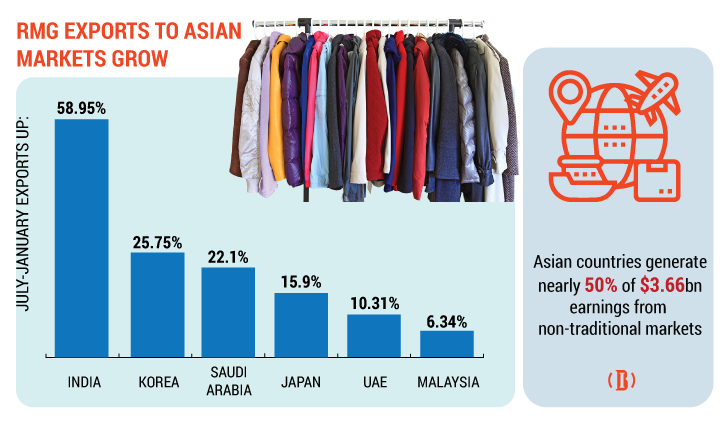In the last two pandemic years, as transporting merchandise got difficult, Bangladesh’s apparel manufacturers started looking for their nearest destinations for export (and import) trade.
In the Covid-19 pandemic time, Bangladesh’s exports to a number of countries rose notably. According to the Bangladesh Garment Manufacturers and Exporters (BGMEA) Association, apparel exports during the July-January period of fiscal 2021-22 to Japan rose by 15.90 percent, to India by 58.95 percent, South Korea 25.75 percent, Malaysia 6.34 percent, The United Arab Emirates (UAE) 10.31 percent and Saudi Arabia 22.10 percent year on year, respectively.
However, among the Asian markets, Bangladesh fetched the highest amount of foreign currency by shipping apparel to Japan worth $630.69 million, India $418.14 million, South Korea $234.15 million, Malaysia $101.69 million, UAE $150.86 million and Saudi Arabia 87.10 million.
Meanwhile, export to China decreased by 19.66 percent to $131.20 million, year-on-year.
From the non-traditional markets, Bangladesh fetched $3.66 billion during this period of which 47.81 percent or $1.75 billion came from the Asian countries.
The exporters think that during the pandemic, as the importers were searching for a closer sourcing for a shorter lead time, the Asian countries preferred Bangladesh over other nations. Besides, the businesses have been expanding in Asian region as the factory rules and regulations of the Asian buyers are not that stringent, exporters said.
“Primarily, apparel exports to all the markets have been increasing day by day as Bangladesh earned a reputation to be a dependable source. Besides, being a new exporter, we get 4 percent of incentives for shipping to Asian countries,” Sahahidullah Azim, vice president of BGMEA, told the Business Insider Bangladesh from the United Arab Emirates through WhatsApp.
On the other hand, it takes only 10 to 12 days to deliver products to these countries whereas it takes 35 to 40 days to send merchandise to a European country or USA. Being within the same region, buyers can import products with less amount of freight charges. And most importantly, both buyers and sellers do not need to be worried about compliance issues, he said.
“It is true that the export of the garment products is increasing, but there is no reason to get excited about it. We are still struggling for survival. We are experiencing a mounting pressure of work orders, but prices are still lower than our expectation,” said Fazle Ahsan Shamim, director of Bangladesh Knitwear Manufacturers and Exporters Association (BKMEA).
Due to high raw material cost and freight charges, export figures may look giant but actual profit is minimal, he said.
Meanwhile, due to Covid-19 restrictions across the global ports, exports had declined in 2020. The losses are now being recovered, he added.
At the same time as the previous fiscal year export to Japan aggregated $546.50 million, India $263 million, Korea 186 million, Chain $163 million UAE $136.77 million, Malaysia $95.63 million, and Saudi Arabia $71.26 million, respectively, BGMEA data shows.
According to BGMEA, Bangladesh’s total apparel export stood at $ 27.49 billion during July-January of 2021-22 financial year. The country’s prime products are trousers, shirts, skirts, blouses, underwear, and sweaters.







